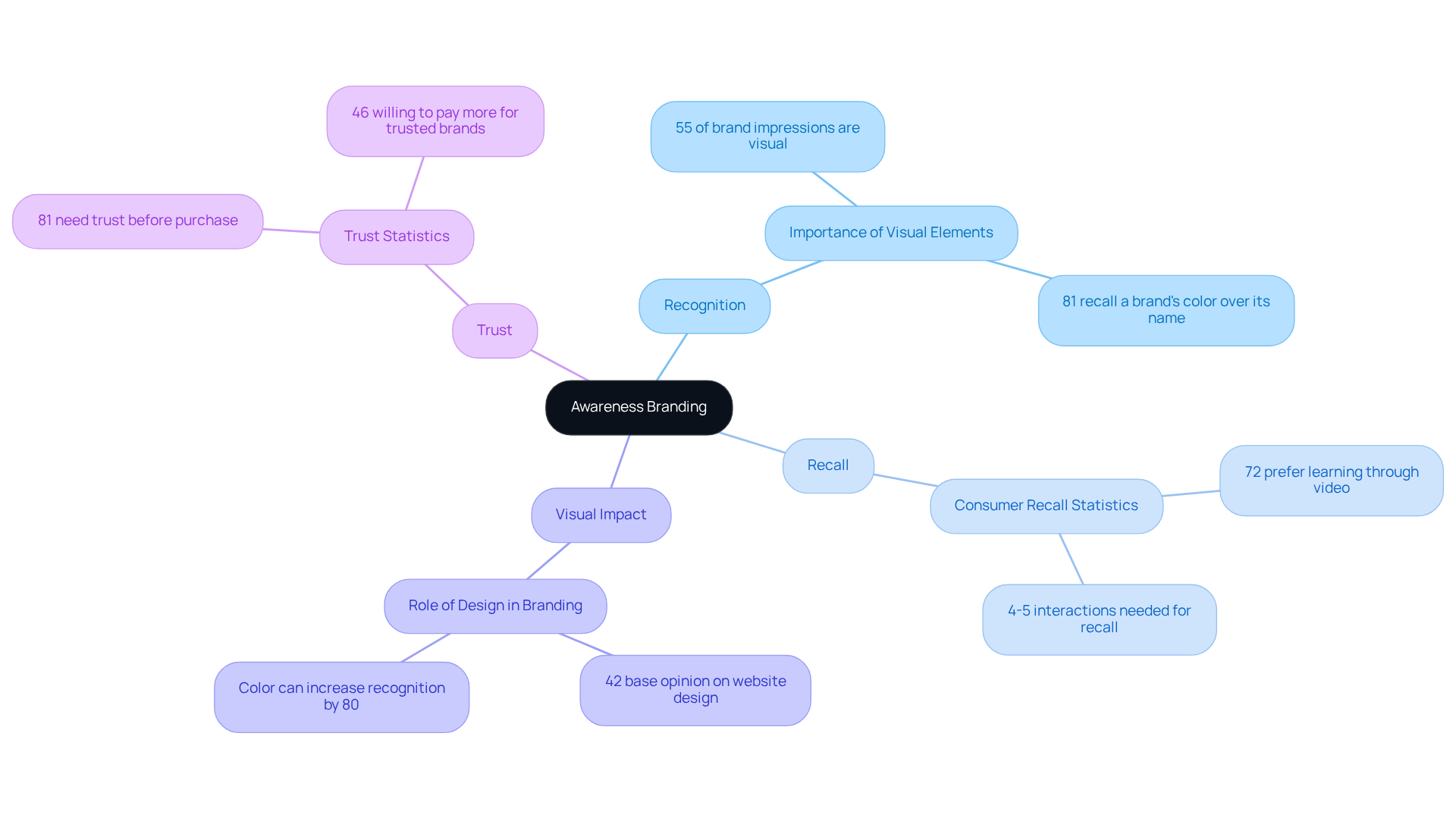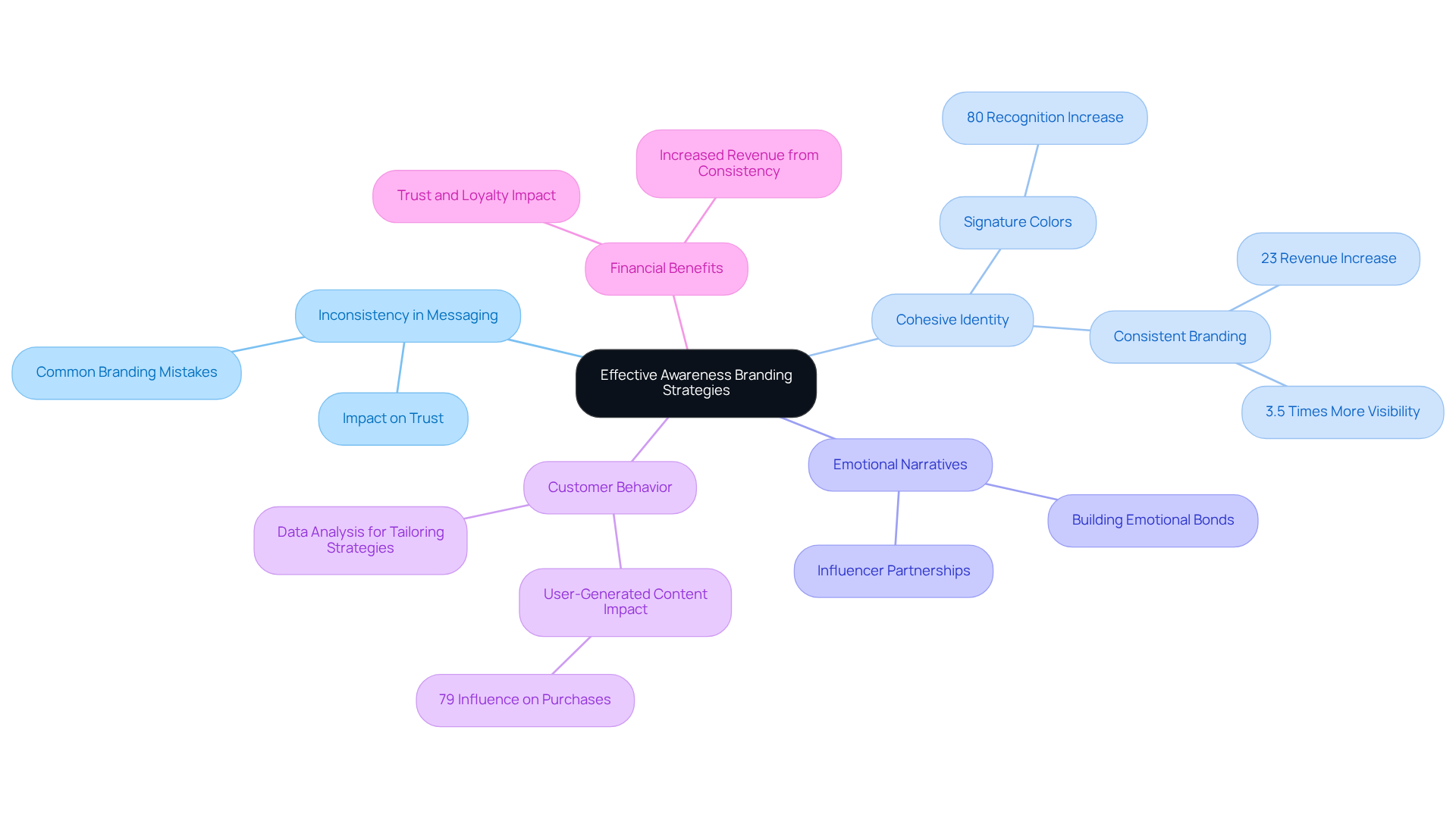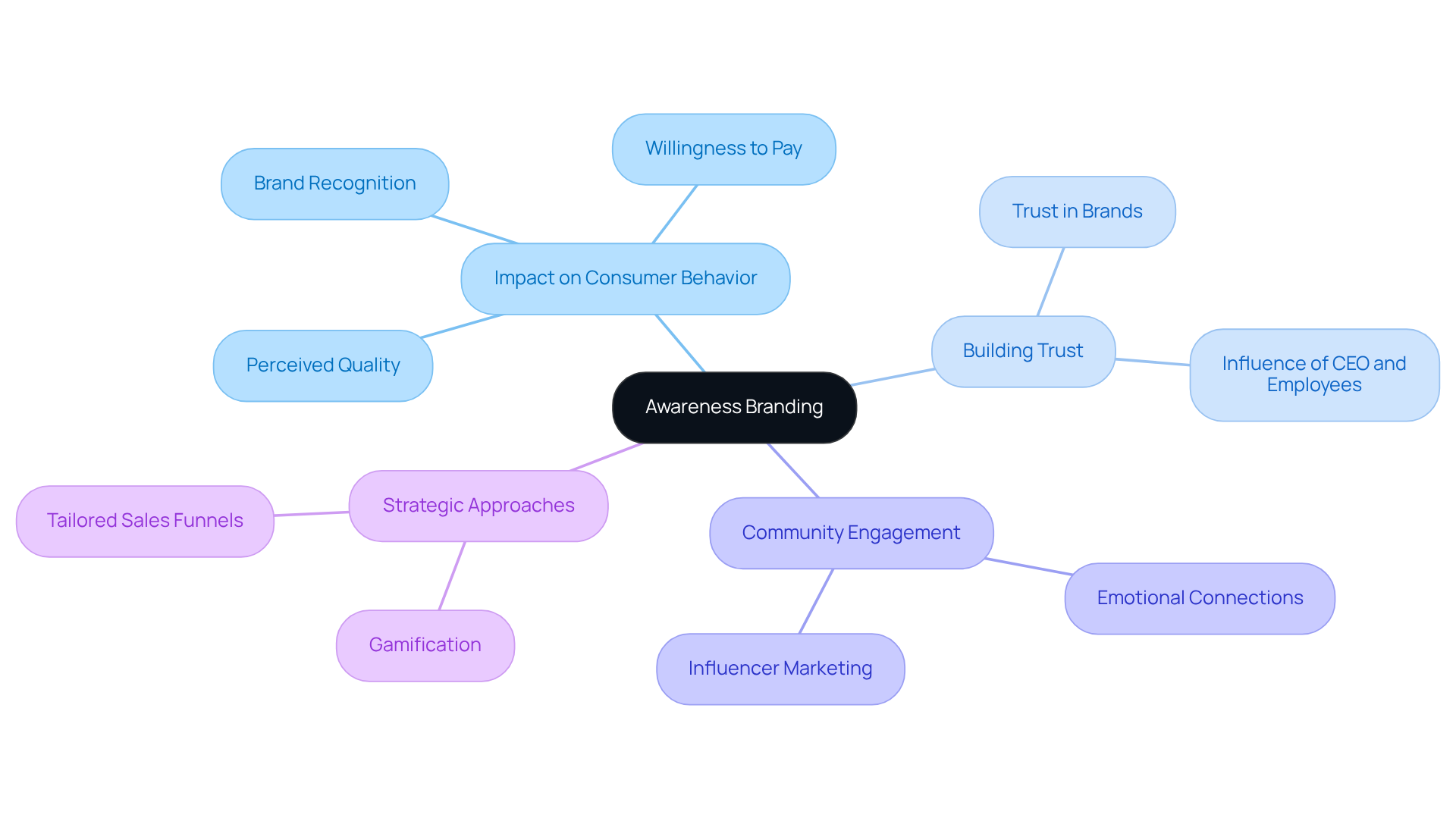Overview
In today’s competitive landscape, understanding awareness branding is more important than ever. Many businesses struggle with customer recognition, which can lead to a lack of trust and loyalty. This is a common challenge that many tech startup founders face, and it can be disheartening to see potential customers gravitate towards familiar brands instead of yours. The reality is that consumers often prefer brands they know and trust, and they are even willing to pay more for them. This highlights the critical role of awareness branding in fostering that recognition and trust.
By focusing on awareness branding, you can create a nurturing environment for your customers. Imagine the comfort they feel when they choose a brand they recognize—one that has established a relationship with them. This connection is essential for driving sales and building loyalty. It’s not just about being seen; it’s about being remembered and valued in the hearts of your customers.
As you navigate the complexities of modern marketing, remember that awareness branding is not just a strategy; it’s a heartfelt approach to connecting with your audience. By nurturing this awareness, you can cultivate lasting relationships that not only enhance customer loyalty but also drive your business forward. Embrace the journey of building a brand that resonates deeply with your customers, and watch as they choose you time and again.
Introduction
In a world where consumers are overwhelmed with choices and messages, awareness branding has become an essential element for businesses. This strategic approach not only boosts a brand's visibility but also nurtures trust and loyalty among customers, ultimately leading to increased sales and market share.
However, as brands seek to distinguish themselves in a crowded marketplace, they face the challenge of creating a cohesive identity that resonates emotionally with their audience. How can businesses navigate this complex landscape to leave lasting impressions and foster meaningful connections with consumers?
By focusing on understanding their audience's needs and emotions, brands can develop strategies that truly engage and connect, paving the way for authentic relationships that stand the test of time.
Define Awareness Branding: Key Concepts and Principles
Awareness marketing represents a vital challenge for many companies striving to enhance their visibility and memorability among customers. This struggle can feel overwhelming, as it involves aimed at fostering familiarity and trust—both crucial for nurturing customer loyalty and driving sales. Key elements of awareness marketing include recognition, which is the ability of consumers to identify a label through its logo or name, and recall, the capacity to remember a label when prompted by a product category.
In 2025, statistics reveal that more than half of initial perceptions of products are visual. This highlights the importance of thoughtful design decisions in marketing strategies. RNO1's commitment to design-oriented solutions ensures that every touchpoint is crafted with an emphasis on impactful design, which is essential for operational resilience and innovation in today’s market. Furthermore, 55% of product impressions rely on visual elements, underscoring the necessity for compelling visual branding. Brands that maintain consistency across various platforms are three to four times more likely to achieve strong visibility, directly correlating with public trust. For instance, 81% of shoppers express the need to trust a brand before considering a purchase, and 46% are willing to pay more when buying from a trusted brand. This emphasizes the crucial role of brand perception in fostering loyalty.
Successful examples in eCommerce demonstrate the effectiveness of awareness branding. Brands that leverage social media effectively find that 77% of shoppers prefer to purchase from those they follow, showcasing the power of digital interaction in building connections. RNO1's innovative performance marketing strategies for eCommerce and retail digital transformation, including the Return On Design & Digital (RODD) strategies, can significantly enhance recognition and recall. Moreover, businesses that prioritize video content, which 72% of individuals favor for learning about products, can greatly improve their recognition and recall.
Expert opinions highlight that a unified marketing strategy, characterized by consistent messaging and visual identity, can lead to a revenue increase of up to 23%. This is particularly significant in today’s competitive landscape, where expectations are high, and companies must clearly convey their values and identities to stand out. Additionally, incorporating color into marketing can boost product recognition by as much as 80%. Ultimately, effective recognition marketing transcends mere visibility; it is about cultivating a positive image that resonates with customers, thereby fostering loyalty and long-term success.

Contextualize Awareness Branding: Importance in Modern Marketing
In today’s marketing landscape, where individuals are bombarded with countless messages daily, the challenge of standing out can feel overwhelming. This is where awareness branding emerges as a vital strategy. It acts as the first touchpoint in a customer’s journey, ensuring that your company stays top-of-mind when it comes to purchasing decisions. Research reveals that companies with strong brand recognition are significantly more likely to capture market share, with 63% of consumers preferring familiar names.
As we navigate this digital-first era, it’s crucial to harness social media, content marketing, and influencer partnerships to enhance visibility and genuinely connect with your target audience. RNO1's strategic rebranding of Founder's Haven beautifully illustrates this approach, empowering modern founders to flourish. Through initiatives like the Ryde program, which focuses on developing content for national campaigns and fostering community engagement, RNO1 has successfully scaled .
This strategic focus not only boosts short-term sales but also nurtures long-term market value, positioning companies for sustained growth in competitive environments. With 80% of consumers more likely to choose a recognizable brand, the importance of cultivating awareness branding is profound. Let’s work together to ensure your brand resonates and thrives amidst the noise, creating a lasting impact in the hearts of your audience.
Trace the Origins of Awareness Branding: Evolution and Adaptation
The evolution of awareness branding has been a significant journey over the decades, and it's one that many of us can relate to. Initially, branding was all about distinguishing products through logos and packaging. However, as markets became increasingly saturated, a deeper challenge emerged: how to foster emotional connections and craft compelling narratives that resonate with consumers. This shift is not merely a trend but a necessity for awareness branding in today’s landscape.
As digital marketing began to take shape in the late 20th century, it transformed our environment. Platforms like social media and online advertising now allow companies to engage directly with their customers, creating opportunities for genuine connections. Today, it’s not enough for companies to be recognizable; they must also utilize awareness branding to connect on a personal level with their audience, which can feel overwhelming. This requires a strategic adjustment, utilizing data analysis and consumer insights to develop focused marketing initiatives that enhance awareness branding and truly resonate with people’s hearts.
For instance, companies leveraging market research insights to optimize have seen conversion rates improve by up to 35%. This statistic underscores a vital truth: authenticity matters. In fact, 68% of US adults favor labels that represent their personal values, highlighting the importance of being genuine in marketing efforts.
RNO1 exemplifies this evolution through its partnerships with various innovative companies. Their collaboration with Spring Labs, a VC-backed FinTech startup, showcases can enhance brand engagement across multiple user touchpoints. Likewise, RNO1's work with Amount, a pioneer in digital financial services, emphasizes the significance of advancing digital product design experiences to meet user expectations in an omnichannel setting.
Moreover, collaborations with Microsoft, Opus9, and CoVenture further demonstrate RNO1's influence in the digital marketing sector. As we navigate this ever-changing landscape, it’s crucial for companies to remain adaptable, constantly honing their strategies to meet the evolving expectations of consumers. Together, let’s embrace this journey, supporting one another in creating meaningful connections that resonate deeply with our audiences.
Identify Key Characteristics of Effective Awareness Branding Strategies
often face a common challenge: inconsistency in messaging and visual identity across various platforms. This inconsistency can dilute recognition and trust, leaving companies struggling to connect with their audience. Research shows that brands that utilize awareness branding with consistently presented identities are 3.5 times more likely to achieve excellent visibility, highlighting the significant financial benefits of cohesive identity representation. Take, for instance, beloved brands like Coca-Cola and McDonald's. Their use of signature colors and logos not only enhances recall but also fosters consumer trust. A signature color can elevate company recognition by an impressive 80%, making it an essential component of a robust visual identity.
To truly resonate with your audience, captivating narratives are vital. These narratives nurture emotional bonds that enhance memorability. As industry expert Monique wisely states, "Enhancing your branding involves understanding your target audience, clearly defining your unique selling proposition, and consistently delivering your message across all platforms." [RNO1's Ryde initiative](https://rno1.com/ryde) beautifully illustrates this by scaling omnichannel ambassador programs that leverage influencer partnerships, creating compelling stories that resonate with diverse audiences. Additionally, implementing national user-generated content programs further boosts visibility and engagement, enriching the connection with your community.
Moreover, understanding customer behavior through data analysis allows companies to tailor their marketing strategies effectively, ensuring that communications align with audience preferences. A blend of traditional and digital marketing channels broadens reach and engagement, while a focus on community building fosters loyalty and encourages valuable word-of-mouth promotion. Industry experts note that maintaining a consistent identity across all platforms is crucial for awareness branding and can lead to revenue increases of up to 23%, showcasing the financial benefits of a cohesive identity. By prioritizing consistency, companies not only enhance visibility but also cultivate trust and loyalty among their customers, creating a supportive environment where everyone can thrive.

Explore the Impact of Awareness Branding on Consumer Behavior
In today’s competitive landscape, many tech startup founders face the challenge of establishing brand recognition. This can lead to feelings of uncertainty, especially when it comes to influencing buyer behavior. The truth is, awareness branding is essential as it shapes perceptions and drives purchasing decisions. When potential customers become familiar with a brand name, it cultivates trust, which is essential for increasing sales and fostering customer loyalty. Research indicates that when consumers recognize a label, they often perceive it as having greater quality and worth. This recognition prompts them to be more willing to pay a premium for brands they know and trust.
Moreover, awareness marketing creates a sense of community. When individuals engage with companies that resonate with their values and lifestyles, they form emotional connections. This not only encourages repeat purchases but also inspires them to promote the brand within their networks, enhancing its visibility and reputation. For instance, consider that 63% of consumers in the tech industry are more likely to choose familiar brands. This statistic highlights the significant competitive advantage that comes with brand familiarity.
So, how can you effectively leverage awareness branding? By focusing on community engagement and utilizing —such as gamification and tailored sales funnels—you can create lasting impressions. These approaches not only drive growth but also nurture loyalty in an increasingly crowded marketplace. Remember, it’s about connecting with your audience on a personal level, fostering trust, and building a supportive community around your brand. Together, we can navigate these challenges and create a brand that resonates deeply with your customers.

Conclusion
Awareness branding presents a significant challenge for many brands striving to establish a meaningful presence and cultivate customer loyalty. It can feel overwhelming to ensure that your brand remains at the forefront of consumers' minds during their purchasing decisions. However, by focusing on recognition and recall, you can forge genuine connections with your audience, nurturing their trust and loyalty. This thoughtful approach not only enhances visibility but also lays the groundwork for long-term success in an increasingly competitive marketplace.
Reflecting on key insights, it's clear that effective awareness branding relies heavily on consistency in messaging and visual identity across various platforms. Brands that embrace these strategies often witness remarkable improvements in recognition and recall, which can lead to increased market share and deeper customer loyalty. Moreover, harnessing the power of digital marketing channels, social media, and compelling narratives can help you create emotional connections with consumers, enriching their overall experience with your brand.
The importance of awareness branding truly cannot be overstated. It transcends mere visibility; it’s about making a lasting impact that resonates with customers on a personal level. As you navigate the complexities of modern marketing, prioritizing awareness branding strategies will not only foster trust but also encourage community engagement, ultimately driving growth. By embracing these principles, you can empower your brand to thrive amidst the noise, ensuring that you leave a lasting impression in the hearts and minds of your audience.
Frequently Asked Questions
What is awareness branding?
Awareness branding is a marketing strategy focused on enhancing a company's visibility and memorability among customers. It involves tactics aimed at fostering familiarity and trust, which are essential for customer loyalty and driving sales.
What are the key elements of awareness marketing?
Key elements of awareness marketing include recognition, which is the ability of consumers to identify a brand through its logo or name, and recall, the capacity to remember a brand when prompted by a product category.
How important are visual elements in awareness branding?
Visual elements are crucial in awareness branding, as more than half of initial perceptions of products are visual. About 55% of product impressions rely on visual elements, highlighting the necessity for compelling visual branding.
What impact does brand consistency have on visibility and trust?
Brands that maintain consistency across various platforms are three to four times more likely to achieve strong visibility, which directly correlates with public trust. A significant percentage of shoppers express the need to trust a brand before considering a purchase.
How can social media influence awareness branding?
Effective use of social media can significantly enhance awareness branding, as 77% of shoppers prefer to purchase from brands they follow, showcasing the power of digital interaction in building connections.
What role does video content play in awareness branding?
Video content is pivotal for improving recognition and recall, with 72% of individuals favoring it for learning about products. This makes it an effective tool for enhancing brand awareness.
What are the benefits of a unified marketing strategy?
A unified marketing strategy characterized by consistent messaging and visual identity can lead to a revenue increase of up to 23%, which is significant in today’s competitive market.
How does color influence product recognition?
Incorporating color into marketing can boost product recognition by as much as 80%, making it an important aspect of awareness branding.
Why is awareness branding important in modern marketing?
In a landscape saturated with messages, awareness branding serves as the first touchpoint in a customer’s journey, helping companies stay top-of-mind for purchasing decisions. Companies with strong brand recognition are more likely to capture market share, as 63% of consumers prefer familiar names.
What strategies can companies use to enhance their awareness branding?
Companies can enhance their awareness branding by harnessing social media, content marketing, and influencer partnerships to connect with their target audience and boost visibility.




